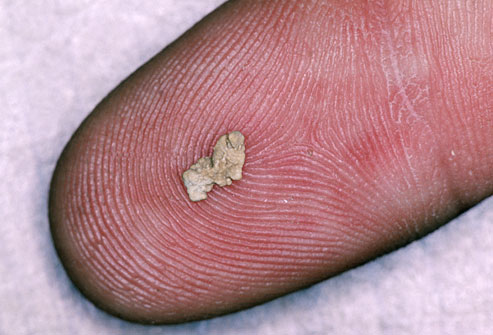Posted on November 24th, 2016

Kidney stones, also called renal calculi, are solid concretions (crystal aggregations) of dissolved minerals in urine; calculi typically form inside the kidneys or bladder. The terms nephrolithiasis and urolithiasis refer to the presence of calculi in the kidneys and urinary tract, respectively.
Renal stone or calculus or lithiasis is one of the most common diseases of the urinary tract. It occurs more frequently in men than in women and in whites than in blacks. It is rare in children. It shows a familial predisposition.
Urinary calculus is a stone-like body composed of urinary salts bound together by a colloid matrix of organic materials. It consists of a nucleus around which concentric layers of urinary salts are deposited.
Renal calculi can vary in size from as small as grains of sand to as large as a golf ball.
Cause of Kidney Stones
- HYPEREXCRETION OF RELATIVELY INSOLUBLE RINARY CONSTITUENTS such as oxalates, calcium, uric acid, cystine and certain drugs (such as magnesium trisilicate in the treatment of peptic ulcer).
- PHYSIOLOGICAL CHANGES IN URINE such as Urinary pH (which is influenced by diet and medicines), Colloid content, Decreased concentration of crystalloids, Urinary magnesium/calcium ratio.
- ALTERED URINARY CRYSTALLOIDS AND COLLOIDS.
- Either there is an increase in the crystalloid level or a fall in the colloid level, urinary stones may be formed.
- If there is any modification of the colloids e. g. they lose their solvent action or adhesive property, urinary stones may develop.
- DECREASED URINARY OUTPUT OF CITRATE.
- VITAMIN A DEFICIENCY.
- The desquamated cells form nidus for stone formation. This is more applicable to bladder stones.
- URINARY INFECTION.
- Infection disturbs the colloid content of the urine, also causes abnormality in the colloids (which may cause the crystalloid to be precipitated).
- Infection also changes urinary pH and also causes increase in concentration of crystalloids.
- URINARY STASIS.
- It causes a shift of the pH of the urine to the alkaline side, predisposes urinary infection, and allows the crystalloids to precipitate.
- HYPERPARATHYROIDISM.
- Due to overproduction of parathormone the bones become decalcified and calcium concentration in the urine is increased. This extra calcium may be deposited in the renal tubules or in the pelvis to form renal calculus.
- PROLONGED IMMOBILISATION.
- NIDUS OF STONE FORMATION.
Symptoms of Renal Calculi
- Colicky pain: “loin to groin”. Often described as “the worst pain […] ever experienced”.
- Hematuria: blood in the urine, due to minor damage to inside wall of kidney, ureter and/or urethra.
- Pyuria: pus (white blood cells) in the urine.
- Dysuria: burning on urination when passing stones (rare). More typical of infection.
- Oliguria: reduced urinary volume caused by obstruction of the bladder or urethra by stone, or extremely rarely, simultaneous obstruction of both ureters by a stone.
- Abdominal distension.
- Nausea/vomiting: embryological link with intestine – stimulates the vomiting center.
· Fever and chills.
- Hydronephrosis.
- Postrenal azotemia: when kidney stone blocks ureter.
- frequency in micturation: Defined as an increase in number of voids per day (>than 5 times), but not an increase of total urine output per day (2500 ml). That would be called polyuria.
- loss of appetite.
- loss of weight.
Homeopathy treats the person as a whole. It means that homeopathic treatment focuses on the patient as a person, as well as his pathological condition. The homeopathic medicines are selected after a full individualizing examination and case-analysis, which includes the medical history of the patient, physical and mental constitution etc.